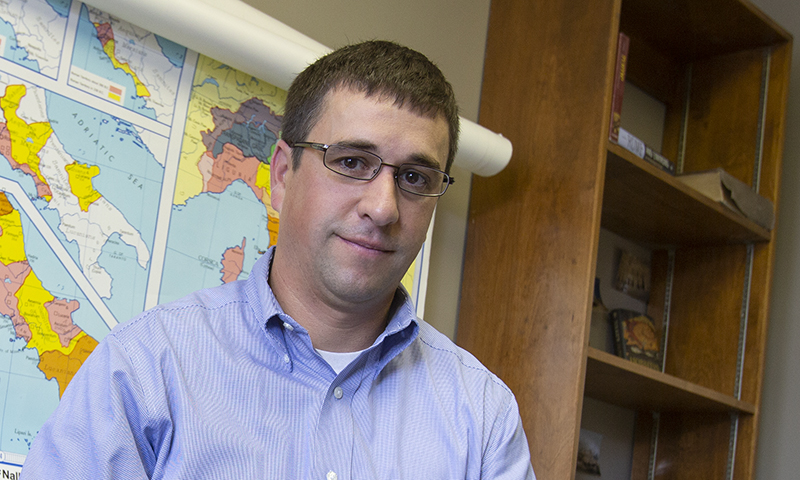
James Capreedy

James A CapreedyAssociate Professor of Greek and Roman Studies
Joined faculty in 2009
Ph.D., The University of British Columbia
M.A., Tufts University
B.A., Hamilton College
Contact Information
Scholarly Interest
- Ancient Greek Alliances
- Greek and Roman Historiography
- Classical Sparta
- Teaching Classics with Maps and GIS tools
Teaching Experience
Assistant Professor of Classics, Department of Classics, 2009 to present
Hobart and William Smith Colleges, Geneva, NY
Visiting Assistant Professor of Classics, Department of Classics, 2008 to 2009
Colby College, Waterville, ME
Academic Year Lecturer, Classics Department, 2007 to 2008
Santa Clara University, Santa Clara, CA
Chair, History Department and Upper School Teacher, 2004 to 2007
Sage Ridge School, Reno, NV
Visiting Assistant Professor of Classics, 2002 to 2003
Ball State University, Muncie, IN
Research
I began my career in Classics as a philologist. How we understand texts depends on our grasp of the language, and the structure and style of any ancient text informs our understanding of the text and its historical context. Specifically, I enjoy examining the work of the ancient historians and I am currently researching Xenephon's biography of the Spartan king Agesilaos. Written by Xenophon in the fourth century BCE, this work has elements of encomium, biography and history. In addition to my work as a philologist, I am also currently examining the relationship between the smaller Greek alliances and the larger hegemonic ones, such as Sparta’s Peloponnesian League. I am interested not only in how centrifugal forces pulled Sparta’s larger alliance apart – that is, how the needs of its allies challenged Sparta’s ability to maintain its hegemony - but rather how a detailed analysis of Peloponnesian history reveals that the smaller states used these hegemonic regional alliances that were devoid of federal institutions as the first and necessary step towards autonomy and independence. Finally, my pedagogical interests concern place and space and investigate how we can best teach the relationship between geography and ancient history. My project (The Nearchus Project) argues that the use of an instructor-led mapping tool is a beneficial teaching method that easily integrates the use of mapping technology and historical GIS (HGIS) within Classical studies courses.
Courses Taught
- Beginning Latin
- Intermediate Latin: Livy, Ab Urbe Condita, Book 1
- Intermediate Latin: Cicero’s Letters
- Advanced Latin: Tacitus, The Annals, Book 1
- Beginning Greek
- Intermediate Greek: Plato, The Republic, Book 1
- Intermediate Greek: Herodotus' Histories
- Advanced Greek: Aristophanes, The Clouds
- Advanced Greek: Xenophon’s Agesilaos
- Sparta: Greece’s Warrior Society
- Alexander The Great
- Ancient Greek History: Athens and the Age of Perikles
- Ancient Greek and Roman Law
- The Fall of the Spartan Hegemony
- Ancient Comedy
- The Romans, Republic to Empire
- The Fall of the Roman Empire
- European Studies 101: Foundations from Antiquity to Renaissance
Publications
Recent Publications
“Technology, Maps, and Teaching Ancient History,” NECJ 42.3 (2015)
“Losing Confidence in Sparta: The Creation of the Mantinean Symmachy,” Greek, Roman, and Byzantine Studies 54 n.3 (2014) 352-378.
“A League within a League: The Preservation of the Elean Symmachy,” Classical World 101.4 (2008): 485-503.
- Digital Pedagogy
The Nearchus Project, a web-based mapping application, www.nearchus.org.
- Recent Presentations
"Bringing the Map to Life: Technology in the Classroom," Annual Meeting, Classical Association of the Atlantic States (CAAS), October 2014
“Mapping Antiquity, an Approach to Using Geospatial Software in Classics," Annual Meeting, Classical Association of the Mid, West and South (CAMWS), May 2014.
"Losing Confidence in Sparta: The creation of the Mantinean Symmachy", Annual Meeting, Classical Association of New England (CANE), April 2014.
"Technology, Maps, and Teaching Ancient History", Annual Meeting, Classical Association of New England (CANE), April 2014.
"Leagues within Leagues: Elis", Annual Meeting, The American Philological Association/American Institute of Archaeology (APA/AIA), January, 2006.
PROFESSIONAL AFFILIATIONS
- Classical Association of the Atlantic States (CAAS)
- Classical Association of New England (CANE)
- Classical Association of the Mid, West, and South (CAMWS)
- Society of Classical Studies (formerly, The American Philological Association [APA])
- Association of Ancient Historians (AAH)
- Association of American University Professors (AAUP)
PERSONAL STATEMENT
Classics can be defined as the study of the Ancient Greeks and Romans and in its broadest terms concerns all aspects of their cultures. Although arguments can be made for the antiquarian appeal of studying Classics, for me the values and experiences of the Greeks and Romans resonate with those of our own society. I believe that the study of antiquity is therefore both a personal and intellectual journey and I enjoy teaching the languages and histories as such.
A proper examination of the past depends on a close reading of the evidence and the consideration of all methods of analysis. My classes tend to be hybrids where the ancient texts are placed beside modern methodologies and technologies; we can read Thucydides or Herodotus one day and create our own historical map of the Roman Empire the next. How we examine texts and antiquity is an important part of my classes, and I believe that collective inquiry can often lead to a more robust analysis.
